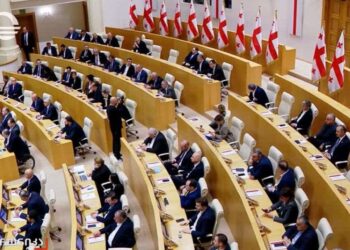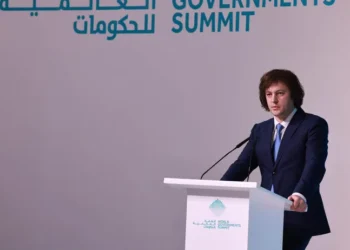“Trump wants the war to end, but not to safeguard Ukrainian democracy or help them join NATO or the EU. He wants the war to end so he can move on, repair relations with Putin, and focus on what he thinks matters—containing China, preferably with Russian help,” says Christian Caryl, veteran foreign correspondent, author, and columnist at Foreign Policy, in a wide-ranging interview with Radio Free Europe’s Georgian Service.
From the resilience of Ukraine’s civil society and the warning signs in Zelensky’s leadership, to Trump’s erratic dealings with Russia and Europe, and the growing sense of American drift in the South Caucasus—Caryl draws an unsparing but nuanced portrait of a geopolitical landscape in flux. The war may still be Ukraine’s to win or lose, but Georgia, once Washington’s darling, is quietly vanishing from the map.
Let’s begin with the protests in Ukraine and the reasoning behind them. What happened, and how damaging has it been, both for Ukraine and for President Zelensky personally?
What’s been happening in Ukraine has shown us the extraordinary resilience of civil society there. Ukrainian citizens feel a strong responsibility for their country—they don’t just leave it up to their leaders. Despite President Zelensky’s extraordinary leadership since the full-scale invasion, when he moved to suppress the anti-corruption infrastructure, Ukrainians said: “No, that’s a red line. You cannot do that. We’re not going to take that lying down.” And they went out into the streets in their tens of thousands. Zelensky has now backed off, but let’s see if he really sticks with his promise.
As for the damage—I don’t think this has harmed Ukraine’s reputation in Europe or among most Americans. I think most people in the West have taken it the right way—they’ve seen it as a source of strength, as a demonstration of the vitality of Ukrainian democracy, which is what Ukraine has been fighting for. Ukraine has been fighting for the chance to not be Russia, which has no democracy whatsoever.
Zelensky? I think it’s a more complicated picture. I know from my own visits to Ukraine over the past few years and from conversations with diplomats and leaders in various countries that there has been a lot of concern in the EU in particular about some of Zelensky’s more dubious moves. For example, he has put pressure on media outlets he views as critical—such as Ukrainska Pravda. Members of opposition parties will tell you that their leaders have faced questionable charges on a variety of issues, and all kinds of pressure.
There is a broader pattern of concerning developments, many of which are attributed to Zelensky’s very powerful Chief of Staff, Andriy Yermak—a rather tough and ruthless politician who has used his role as gatekeeper to Zelensky to concentrate a lot of power in his own hands.
From a grey cardinal to a cardinal out in the open?
Yes, he’s very much in your face, really. And he was quite unpopular with senior members of the Biden administration. But he couldn’t be doing these things without Zelensky’s approval, right?
And now the attacks on the anti-corruption agency—what we’ve actually seen is that these agencies have uncovered real malfeasance by people at the highest levels of the Ukrainian government—people who’ve been getting rich off weapons deliveries or government support. Those who were exposed have gone to jail, lost their positions, or seen the end of their political careers.
So, it’s a worrisome pattern, and I think these protests have allowed the Europeans to speak up and voice criticisms that they were probably too timid to express earlier—criticisms of the President and his administration.
Can Zelensky recover from this, as he did, for example, from the White House debacle earlier this year?
The Trump debacle cut two ways: it strengthened Zelensky’s standing among the Europeans, and I think it also made him more popular among a wide segment of the Ukrainian population, who saw him standing up to yet another bully. So, overall, that confrontation with Trump in the White House actually boosted Zelensky’s standing. His recovery from that incident was quite remarkable.
But can he come back from this without his reputation being blemished? I have doubts. I think he has revealed something about himself to Ukrainian voters that won’t make him more popular. People have accepted him as a wartime leader—someone who rallies the troops, gets out front, and shows personal courage.
I’m a great admirer of Zelensky on that front, but if you ask people who know him, including journalists who’ve interviewed him multiple times, they’ll all tell you: he’s not an administrator. He’s not someone who manages things well. He’s not a great manager of government.
So when Ukraine eventually needs more of an administrator than a wartime leader, that could spell trouble for him?
Yes, and I drew what I think is a really intriguing parallel in an article I just wrote for Foreign Policy—between Zelensky and Winston Churchill. A lot of people in the West have compared Zelensky to Churchill: standing tall in the face of a dire threat.
But Churchill did something Zelensky hasn’t—he formed a national unity government, including the opposition. Zelensky, most notably, has not done that. He’s marginalized the opposition and driven away many who might have been willing to cooperate in a unity government.
And what happened to Churchill in 1945 when the war ended? Voters resoundingly voted him out of office. Not because they didn’t think he did a good job, but because they felt the post-war period required someone who could manage the immense challenges a bankrupt United Kingdom faced after the war with Germany and Japan. They overwhelmingly voted for the Labour Party.
I wouldn’t be surprised at all to see something similar happen in Ukraine—especially if the competing candidate were General Zaluzhnyi, who still enjoys enormous popularity. He does seem to be a good manager—certainly during wartime. Whether he has the political chops or the desire? We don’t know yet.
Let’s talk about Trump’s much-discussed 50-day deadline to Putin—wasn’t it more of a green light than a warning? Putin calls Trump, says he’ll achieve his goals in 60 days. Then Trump gives him a 50-day deadline to come back to the negotiating table. So, for 49 days, Putin can act freely, then show up on day 50 pretending he wants peace?
I agree with that interpretation—it’s a 50-day green light. I found that deadline extremely odd. Why 50 days?
Many people have accepted Trump’s deal very uncritically. Instead of the US directly supplying weapons to Ukraine, suddenly the Europeans are responsible for finding the money and providing them. And yes, it’s good that the Europeans are willing—but under the guise of halting shipments, Trump has actually reduced America’s direct involvement.
We’re not paying for anything. The terms of the deal are murky. There’s a lot of wiggle room for Trump to do what he wants. It’s not like this was a Senate-ratified agreement. It’s more of a back-slapping arrangement between Trump and the Europeans. As far as I can tell, nothing is set in stone.
And we know Trump is great at making promises that sound big. Everyone moves on, and then nothing happens. So yes, I’m very skeptical.
He has since cut that deadline down—from 50 days to 10–12. Is that a sign of serious intent?
Trump’s shift once again shows how unreliable his deadlines are. I doubt the Russians took the last one seriously, and they probably won’t take this one seriously either.
I still don’t believe he’ll enforce any serious sanctions. What would impress me is the US delivering large numbers of high-end weapons to help Ukraine win the war. That would hurt Russia and might actually bring them to the table. But nothing Trump is doing right now feels serious.
On the murky side—what exactly are the Ukrainians getting, in what quantities, and when? Take the Patriots, for example. The reported numbers vary wildly—some say five, others as high as 17. What do we actually know?
Originally, reports said Ukraine would get 10 Patriot systems. Then, after Trump’s deal, the number seemed to shrink to 2–5. The Germans have said they want to provide, I believe, five systems.
But the issue is this: having a Patriot battery is great, but how many missiles? Each missile is very expensive. Is Germany handing over its entire supply? We have no idea.
And time matters—Ukrainians don’t need these in six months. They need them now. Hell, they need them during those 50 days. The whole thing is highly questionable.
Now I’m reading reports that Trump’s new “stick” for Russia is tariffs. The billion-dollar question is: will he follow through? I have serious doubts. Our trade with Russia is minimal—but secondary sanctions on Russian oil buyers like China and India could be powerful.
However, those would also affect global oil prices, including in the US. I’m almost certain those sanctions would complicate America’s relations with those countries. Does Trump want that? Take the bill sponsored by Senators Graham and Blumenthal—it has over 80 sponsors and so will sail through if they want to pass it. It would impose some really draconian secondary sanctions on those countries that are buying Russian oil. But Trump hasn’t said if he approves of that bill or not, aside from ensuring it includes a clause giving the President the sole power to call it off. Once again, we see very clearly his unwillingness to cede any sort of power to Congress and to keep all the cards in his own hand. And if he wakes up one morning and his diet coke tastes wrong, he will walk it all back and decide he’s not really in favor.

So his strategy on Ukraine is… no strategy?
For whatever reason, I think he genuinely wants the war to end. It’s an irritant for him. It complicates everything.
One thing he really doesn’t like is that it keeps dragging him into Europe—and on a fundamental level, he doesn’t want anything to do with Europe. He thinks it’s old and tired. The war keeps him tethered to leaders like Macron and Scholz, which I’m sure bores him to death.
So yes, he wants the war to end, but not to safeguard Ukrainian democracy or help them join NATO or the EU. He doesn’t care about that. He wants the war to end so he can move on, repair relations with Putin, and focus on what he thinks matters—containing China, preferably with Russian help.
He still believes he can work with Putin against China, which I think is a nonsensical pipe dream.
Speaking of China—Chinese FM Wang Yi recently said China cannot afford Russia to lose in Ukraine. Can the US afford Ukraine to lose?
What a great question. I think that’s exactly the right question people should be asking.
If Trump genuinely wants to contain China, that statement should’ve been a massive wake-up call. China clearly sees a strategic interest in Ukraine losing. So what does that say about its broader designs on Eurasia?
Wouldn’t helping Ukraine win be a huge blow to China’s ambitions in the region? To me, the answer is obvious. But I don’t think Trump wants to see that.
The counterargument is that a defeated Russia becomes a full-fledged vassal of China—thus strengthening China further.
I think Russia already is a vassal of China to a significant degree.
But Trump believes he can split Russia off from China. It’s what we call the “reverse Nixon.” Remember, Nixon went to China to split them from the USSR. But the world today is different. Back then, Mao hated the Soviets and needed new allies.
Now? China and Russia have built a comprehensive alliance—they’re joined at the hip. Russia can’t sell energy to Europe anymore, so it’s dependent on China. It’s dependent on Chinese tech. It’s a parasitic twin in that Siamese relationship.
And a question about Georgia. You’ve visited recently and reported on it. With things in Azerbaijan and Armenia as they are—Baku’s relationship with Moscow at a low point, and Pashinyan openly rebelling—has Georgia effectively become Russia’s last outpost in the region?
It’s sort of looking that way, isn’t it? That’s exactly how it felt during my last visit there, just last month.
It’s a grim situation—I was really disheartened. The most depressing thing is the rhetoric coming from Georgian Dream. And their actions speak just as loudly—jailing opposition figures and protesters, slapping draconian fines on demonstrators.
They seem to have this maximalist approach: “Wipe them all out now, clean the political field—and then the West will accept us.” No.
They have a terrible image right now, and they’re doing nothing to fix it.
Or maybe they’re relishing it—hoping that the worse it looks, the more Georgia is seen as a lost cause. How far down is Georgia on the current US administration’s agenda?
Georgia has really slipped off the list of American foreign policy priorities.
I remember in the early 2000s, Georgia was high on that list. There was strong congressional support—people knew where Georgia was on the map and why it mattered.
That’s no longer the case. It’s dropped off the radar.
Yet, at least theoretically, that could change. The MEGOBARI Act could introduce drastic shifts—if it passes. Will it?
My sense is that it’s currently stalled. It hasn’t garnered the support it needs, and I don’t see who’s going to champion it all the way through.
A lot of people are working hard to get it through Congress, but it’s stuck. I think Marco Rubio and others in the White House just have other fish to fry.
I don’t think they fully understand what’s happening in Georgia. I genuinely believe that. They haven’t even decided which side to support yet.
I’m not sure that Georgian Dream is entirely to Marco Rubio’s liking. I don’t see him rushing to call them friends of America.
Right now, what I see is a stall—and stagnation—in U.S. policy toward Georgia.
Interview by Vazha Tavberidze














